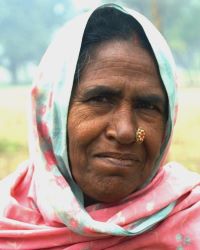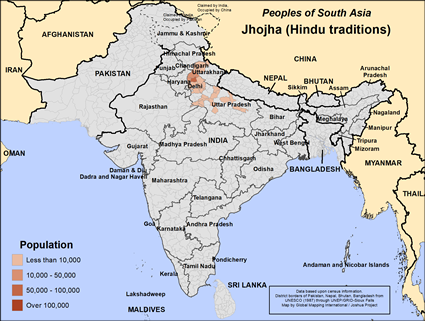Jhojha (Hindu traditions) in India

Photo Source:
Copyrighted © 2026
Isudas All rights reserved. Used with permission |

Map Source:
People Group data: Omid. Map geography: UNESCO / GMI. Map Design: Joshua Project.
|
| People Name: | Jhojha (Hindu traditions) |
| Country: | India |
| 10/40 Window: | Yes |
| Population: | 174,000 |
| World Population: | 174,000 |
| Primary Language: | Hindi |
| Primary Religion: | Hinduism |
| Christian Adherents: | 0.00 % |
| Evangelicals: | 0.00 % |
| Scripture: | Complete Bible |
| Ministry Resources: | Yes |
| Jesus Film: | Yes |
| Audio Recordings: | Yes |
| People Cluster: | South Asia Hindu - other |
| Affinity Bloc: | South Asian Peoples |
| Progress Level: |
|
Introduction / History
The men of Hindu Jhojha were once soldiers in the armies of north India. Their name Jhojha comes from a word meaning, "battle."
The Jhojha are essentially small and medium sized farmers. Their villages tend to be of one caste. The Jhojha cultivate wheat, maize, sorghum and sugar cane.
The Jhojha have tried to obtain status as an Outward Backward Scheduled Caste but so far have been unsuccessful. Indian Scheduled Castes receive special preference for government jobs and university admissions.
The primary language of the Jhojha is Hind. They also speak other regional languages.
Where Are they Located?
Most Hindu Jhojha live in the Indian state of Uttar Pradesh. A smaller group resides in Uttarakhand.
What Are Their Lives Like?
The Jhojha are an endogamous community, that is, they prefer marrying close kin. The families arrange marriages with the consent of the young people. Sons inherit their father's property. The newly married couple lives near or with the groom's parents. Monogamy or marriage to one wife is the general rule.
The Jhojha have fairly active caste councils, which deals with community welfare as well as an instrument of social control.
The Jhojha are not vegetarians but as Hindus they do not eat beef. Their main foods are wheat, maize, sorghum and seasonal vegetables and fruit.
What Are Their Beliefs?
The Jhojha practice Hinduism, the ancient religion of India. The worship and serve the gods of the Hindu pantheon. They believe that by performing certain rituals and good works that they can attain moksha, knowledge and freedom. They will then escape the endless cycle of birth, death and rebirth. The Jhojha visit Hindu temples to offer prayers, food, flowers and incense to their gods in a hope to obtain favor.
The Jhojha participate in the yearly Hindu holidays of Holi, the festival of colors, Diwali, the festival of lights and Navratri, the celebration of autumn.
What Are Their Needs?
The Hindu Jhojha need to hear and understand the life-changing message of Jesus Christ. They need to see the love and mercy of Christ lived out in practical ways before them by Christians. They need help in bringing modern conveniences to their villages and in educating their children.
Prayer Points
Pray the Jhojha will turn from their Hindu gods to the true God of the Bible.
Pray that the Lord leads Christian workers to befriend and serve the Jhojha.
Pray that the Lord raises up Bible-believing churches in the Jhojha community.